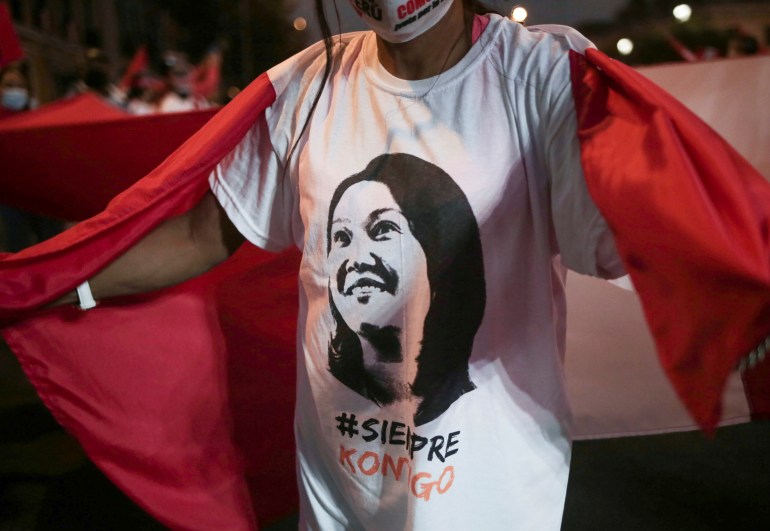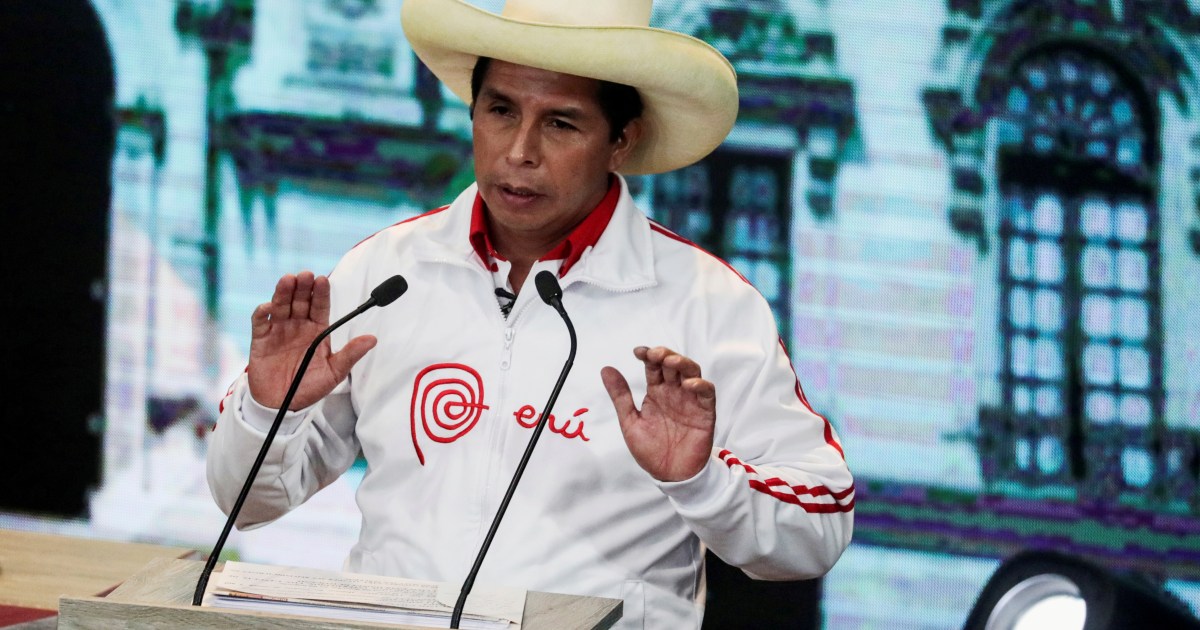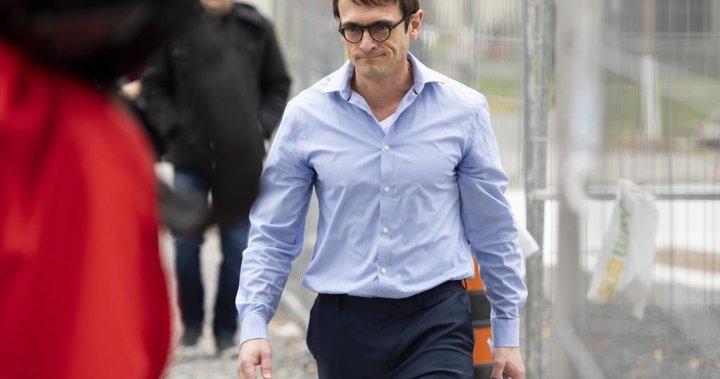Uncertainty lingers as Peru edges closer to Castillo presidency | Elections News
Lima, Peru – With the world’s highest reported coronavirus death toll per capita and a third wave expected to start washing over the country later this month, Peru’s COVID-19 vaccination programme could hardly be more critical.
And as the inoculation effort of outgoing interim President Francisco Sagasti picks up steam, the government has recommended that apparent incoming President Pedro Castillo avoid any disruptions by keeping on the health ministry officials overseeing it.
“It would give a lot of tranquility,” said Camille Webb, an infectious diseases expert at Lima’s Alexander von Humboldt Institute of Tropical Medicine. “It would be the most prudent thing and also the politically most intelligent.”
Yet with less than two weeks until his expected inauguration on July 28, and more than three months since the first round of Peru’s presidential elections, Castillo’s vaccination strategy remains a mystery – as do his policies on just about everything else, from the economy to education.
Surprise victory
The shock victory of the left-wing 51-year-old rural schoolteacher appears to have surprised him as much as the rest of Peru.
With no experience in public office and no policy advisers until earlier this month, Castillo has made limited public comments since the June 6 runoff election, instead huddling in private talks with members of his Free Peru party.
On the campaign trail, Castillo had made a series of policy promises that rattled large investors and ordinary Peruvians alike, including nationalising Peru’s huge mining sector and banning imports, but which he now appears to have abandoned.
He continues to push for a referendum to set up a constituent assembly, however, arguing that Peru’s current constitution, approved in 1993 under the hard-right and fiercely free market President Alberto Fujimori, who is now in jail for human rights abuses, limits the state’s ability to provide public services such as healthcare and education.
Yet Castillo has yet to clearly articulate what specific policies are blocked by the current Magna Carta.
“You don’t know what Castillo’s going to do because he doesn’t know,” said Pablo Secada, an economist and prominent member of the Popular Christian Party (PPC), a center-right political party. “The uncertainty’s very damaging.”
 A supporter wears a shirt with an image of Peru’s right-wing presidential candidate Keiko Fujimori that reads ‘Always with you’, in Lima on June 26 [File: Gerardo Marin/Reuters]
A supporter wears a shirt with an image of Peru’s right-wing presidential candidate Keiko Fujimori that reads ‘Always with you’, in Lima on June 26 [File: Gerardo Marin/Reuters]‘An unknown’
While Castillo largely stays silent, beyond vague promises that he will provide free COVID-19 jabs for all Peruvians without stating how, Free Peru members and other Castillo allies have been fighting over how far left his government should go.
The debate is being led by party founder Vladimir Cerron, a Marxist former regional governor barred from public office by a corruption conviction and with a record of xenophobic, misogynistic and homophobic comments. He is pushing for Castillo to keep the radical posture he maintained on the campaign trail.
Cerron’s pressure comes despite the fact that the incoming 130-member, single-chamber Congress will be divided between 10 parties but likely controlled by right-wing opposition groups. That includes the Fujimoristas with 24 lawmakers and another ultra-conservative grouping, Popular Renewal, with 13, whose leader has even called for Castillo’s “death”.
That will leave Castillo with little room to maneuver. He could potentially even face a fast-track impeachment like the one that brought down President Martin Vizcarra in November 2020.
“Even after being elected, Castillo remains an unknown,” said Gonzalo Banda, a political scientist at Peru’s Catholic University of Santa Marta. “A few weeks ago, it looked like he was moderating. Now he’s meeting with Cerron again. Who will be [in] his cabinet? There are no announcements, no press conferences. It’s all still a mystery.”
 Supporters of Castillo gather behind a police barricade outside the National Jury of Elections, in Lima, Peru on June 11 [File: Angela Ponce/Reuters]
Supporters of Castillo gather behind a police barricade outside the National Jury of Elections, in Lima, Peru on June 11 [File: Angela Ponce/Reuters]Fraud claims
That has left a dangerous vacuum that Castillo’s runoff opponent, Keiko Fujimori, the daughter of Alberto Fujimori, has been filling with unsubstantiated claims of electoral fraud.
According to Peru’s electoral agency, ONPE, Castillo edged the polarising runoff by 44,000 votes out of nearly 19 million cast, taking 50.13 percent against 49.87 percent for Fujimori.
The election has been deemed free and fair by the Organization of American States, the European Union and the US State Department yet Fujimori, 46, who faces a corruption trial and potentially lengthy jail sentence – unless she acquires presidential immunity – is refusing to concede.
Her lawyers have sought to annul 200,000 votes, mainly from Indigenous and mixed race voters in impoverished communities in the Andes and Amazon, who voted heavily in favour of Castillo. Although independent experts agree her claims are without merit, the time-consuming appeals process has so far prevented the electoral authorities from declaring Castillo the winner.
Her disinformation campaign has convinced a significant minority of Peruvians, especially among the Lima elite who have been spooked by Castillo’s radical messaging, that once inaugurated he will not be a legitimate president.
There have even been calls from retired military officers, including a former admiral who is a favourite to be speaker of the incoming Congress, to refuse to recognise Castillo as president.
‘Does not bode well’
Meanwhile, a small but hardcore group of Fujimori’s supporters that calls itself The Resistance is waging a fierce and frequently violent campaign against the imminent official proclamation of Castillo as the winner of the runoff.
This week they attempted to storm the presidential residence in downtown Lima, attacking journalists and passersby, smashing local shops and stoning two ministerial cars, one of them carrying Health Minister Oscar Ugarte.
Banda estimated that The Resistance has as few as 500 members. Nevertheless, the failure of police and prosecutors to deal with them in recent weeks has set a worrying precedent for the potential for more violence once Castillo takes office, he said.
“Keiko has no control over these people anymore,” Banda told Al Jazeera. “It’s a more extreme right, and they have this sense of impunity. They are used to not facing the consequences. This does not bode well for the next five years.”




